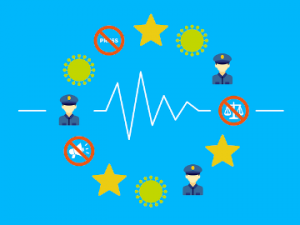Slovenia: New Government Restricts Rights of Environmental Groups
22. 5. 2020 | Human Rights and Minorities, Politics

The new government has restricted access to public participation and justice for environmental non-governmental organisations.
Environmentalists and nature protectionists are describing the recent developments in Slovenia, where the new government has restricted access to public participation and justice for environmental non-governmental organisations, as “a pogrom” and “a declaration of war on the protection of nature and environment” in Slovenia.
In late April 2020, the government included in its coronavirus crisis stimulus package the provisions aimed at deregulation of construction legislation and speeding up of infrastructure investments during the economic recovery. Among the provisions that simplify the procedure for the construction permit are stiffer conditions introduced for environmental NGOs that want to participate in the permitting procedures. According to the Slovenian Press Agency, such solutions allow to investors to override the public benefit of preserving the nature and environment with other public benefits.
The provisions introduce new conditions for participation of the environmental NGOs organised as associations in the procedures, requiring from them to have at least 50 active members, which NGOs prove with regularly paid membership fees and participation at general assemblies. Environmental organisations that have the status of institute need to have at least three fully employed staff with university education in the field, while institutions or foundations need to have at least EUR 10,000 in assets. The conditions for all three legal forms of environmental organisations apply retrospectively, for two years back.
In Slovenia, non-governmental organisations that obtain the status of acting in the public interest in the field off environmental protection can be, according to Environmental Protection Act, parties in the procedures and can go to court and challenge the decisions in environmental matters. So far, several major investments, which would severely affect the environment, have been successfully challenged by environmental organisations in the courts, within the administrative procedure for obtaining an environmental permit. Some of them have fewer than 50 members. Others do have sufficient number of members to meet the new criteria but did not collect the membership fee as it is not mandatory according to the rules for the sector regulation, and they don’t have or don’t want to disclose their presence lists from their general assemblies.

Ljubljana portrayed in the campaign of the Balkan River Defense “We won’t give up rivers!”
Restrictive provisions challenged at Constitutional Court
So, the new provisions and conditions suddenly included in the coronavirus crisis legislation and adopted by Parliament through emergency action, without public consultations and regular legislative procedure, de facto eliminated the possibility for a vast majority of environmental NGOs with public-interest status from exercising their rights in representing public interest, effectively preventing them from implementing their right to access to public participation and justice.
Currently, 30 environmental NGOs and 47 nature conservation NGOs have the status of acting in public interest, but only a few of them meet the new criteria. The most controversial is the condition to meet these requirements retrospectively, for two years back. The NGOs, but also hundreds of independent experts and other actors in the various fields of protection of nature and environment, sent the appeals to the government requesting not to introduce such measures, but the law has been adopted. It is, however, already challenged in the Constitutional Court by the three NGOs which swiftly submitted an appeal.
But, in May 2020, new restrictive criteria for the participation of nature protection NGOs in the permitting procedures have been introduced also in the amendments to the Nature Conservation Act. This legislative procedure is not yet finished, but the solution is supported by a parliamentary majority so far. This means that some environmental protection NGOs in Slovenia will lose their status, and therefore the right to public participation and access to justice, not only temporarily for the period of coronavirus crisis legislation implementation and not only for the purpose of construction deregulation in that period, but permanently and in all procedures related to nature and environment protection.
The third corona crisis package currently under preparation includes identical conditions for NGOs as already adopted in the second package, which would stay in force until the end of 2021. Additionally, changes of the Environmental Protection Act, Building Act and Spatial Planning Act were announced, all with the intention to shrink the rights of NGOs.
Minister of Environment – an advocate of the investors’ interests
These developments are reported by media in the country, some of them taking a critical stance, while major TV channels have invited the Minister of Environment and Spatial Planning to confront representatives of NGOs. The minister is portraying the non-governmental organisations as a problem for the realisation of major infrastructure projects and investments in the country, claiming they are misusing their status while benefiting from public funding.
The environment minister is from the ruling SDS party, which uses defamatory rhetoric towards non-governmental organisations and advocates for the restrictive measures towards them in various sectors. However, there is specific background to the minister’s particular hostility towards environmental and nature protection organisations. Prior to the current cabinet position, the Minister of Environment, Andrej Vizjak, was a chief of the investment and development department in the hydropower producer Hidroelektrarne na Spodnji Savi (HESS). In 2019, the court annulled the environmental permit for the new HESS hydroelectric power plant – HPP Mokrice – on lower Sava river based on the case initiated by one of the nature protection organisations. The permitting procedure has to be done again and in the position of Minister of Environment, Andrej Vizjak is ensuring that this time the NGOs cannot obstruct the permit. The investment in the HPP Mokrice is estimated at EUR 166.6 million, including EUR 75 million from the state budget.
Citizens protests
The restrictions for the public participation and access to justice for environmental and nature protection organisations have recently led to protests in front of the Parliament during the parliamentary sessions. At the same time, the anti-government cycling protests which regularly gather thousands of protesters in Ljubljana, are expressing a row over claims of political interference in the procurement of protective gear and ventilators during the coronavirus outbreak, but they are also partly motivated by the restrictions for environmental protection introduced by the government.
When talking to journalists and explaining various aspects of the recent restrictions introduced to them, representatives of environmental and nature protection organisations in Slovenia, particularly those operating on local level, point to the fact that the previous governments led by left-center parties, and the mayors in numerous municipalities, no matter their political background, have been making similar efforts to restrict work of environmental organisations. In the mandate of the previous left-center government, the proposals of the government members to restrict criteria for participation of environmental organisations in the permitting procedures were successfully rejected by the then Minister of Environment, who referred to the obligations of Slovenia to implement the Aarhus convention, but the restrictions were pending all the time.
Article by Brankica Petković was published on Liberties Website.




